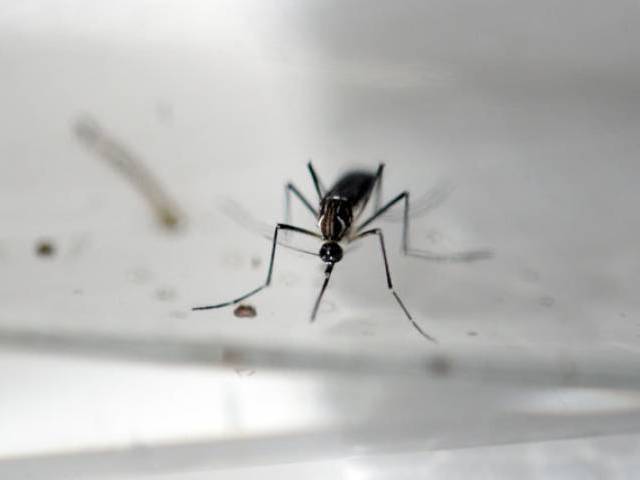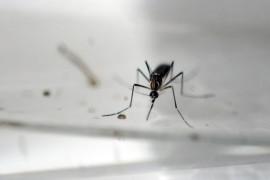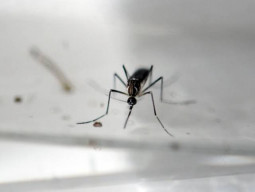
Zika virus mosquitoes found in Pakistan
Understanding Zika and its effects
The virus was first found in 1947, present in a monkey in Uganda’s Zika forest which gave the virus its name. Zika, scientifically referred to as ZIKV, is spread by an infected female Aedes mosquito. It can also be transferred from an infected individual to an uninfected mosquito.
In comparison to dengue and chikungunya, the Zika virus disease is milder and most infected people show no symptoms which may include muscle and joint pain, skin rashes, headache and conjunctivitis. Only one in five people fall sick, making the virus rarely fatal.
An alarming situation, however, is its perinatal transmission or mother-to-child transmission, albeit rarely, which results in microcephaly – a birth defect in which a baby’s head is smaller than normal. The condition is associated with incomplete brain growth which can also be fatal. Last year, more than 4,000 microcephaly cases were reported in Brazil alone. Even though a link between Zika and microcephaly is yet to be proven, WHO has issued specific precautionary measures to prevent perinatal transmission of the infection.
‘Dengue mosquito’s presence can lead to Zika virus outbreak’
The virus is also said to be sexually transmitted, or through exchange of other bodily fluids including blood, urine and saliva. But neither of the possibilities has yet been documented.
A probable link between Zika infection and another serious condition, Guillain-Barré syndrome (GBS), has also been established. GBS is an autoimmune disorder in which a person’s own immune system attacks the peripheral nervous system, which can lead to temporary paralysis and death in severe cases. According to a report published by Clinical Microbiology and Infection in October 2014, the first case of GBS was detected a month after the first Zika case was reported in French Polynesia. Subsequently, GBS cases increased from two to 42 cases, resulting in researchers monitoring the cases with reference to Zika. The lead author of the study, Didier Musso, in an interview with the French magazine Le Point said, “It is illusory to think that one has already seen the possible complications for a disease that emerged only three years ago.”
China confirms first case of Zika virus: Xinhua
How to avoid the virus
In the absence of a vaccine to prevent Zika, the Center for Disease Control and WHO recommends taking the following steps:
* Cover most of your body by wearing long-sleeves shirts and pants, to avoid mosquito bites.
* Stay indoors and install mosquito screens for windows and doors.
* Apply Environmental Protection Agency registered mosquito repellents which are also safe for pregnant and lactating women. And if you are also using sunscreen, apply sunscreen before applying insect repellent.
* Protect babies by dressing them fully and covering their carriers with mosquito nets.
* Mosquito repellents can be used on babies older than two months. However, it is advised that adults should spray repellents on their own hands first and then apply it on their children to check for skin reactions.
* Treat clothes with permethrin, an insecticide, which remains effective even after several washes.
* Routinely change standing water from containers such as pet dishes and flower pots.
* Condoms should be used to prevent sexually-transmitted Zika virus.
Diagnosis and treatment
It is difficult to diagnose Zika based on the symptoms alone, especially in areas where other mosquito-borne diseases are endemic. However, molecular testing can be done to confirm the infection in extremely sick patients. But patients should first consult a healthcare provider to rule out the possibility of dengue or other similar infections as their outcomes are more severe than Zika.
Zika virus — be prepared
In case a person is diagnosed with Zika, they should get plenty of rest and drink lots of fluids to avoid dehydration. Upon consultation from a doctor, take paracetamol for fever and avoid nonsteroidal anti-inflammatory drugs like aspirin, ibuprofen and naproxen until dengue has been ruled out by doctors during examination. Also, to help prevent others from getting sick, avoid mosquito bites during the first week of illness.
Approaches to controlling the disease
Last year, as many as 3,692 dengue cases were reported in Pakistan, of which 3,596 were from Karachi alone. The high incidence of dengue raises concerns for Zika as it is transmitted through the same mosquito.
Under such circumstances, it is better to be prepared and to take necessary measures. These may include a review of travel policies, country wide fumigation routines, awareness campaigns and appropriate training for healthcare providers. To avoid perinatal transmission counselling should be made available to pregnant women and couples planning a baby. In regions with poor health and sanitary conditions mosquito nets and repellants should be distributed.
With the growing concern of neurological disorders in South Asian countries, it is the responsibility of the local and federal government and healthcare institutions to take necessary steps against Zika and to not repeat the same mistakes which resulted in the dengue outbreak.











































COMMENTS (1)
Comments are moderated and generally will be posted if they are on-topic and not abusive.
For more information, please see our Comments FAQ